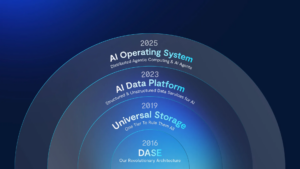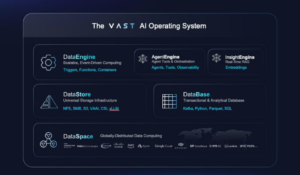

(Image courtesy VAST Data)
It’s not every day that you see a new operating system launched. But VAST Data today claims to have done exactly that with the launch of what it’s calling a new operating system for AI. The VAST AI Operating System builds on the company’s existing data and AI infrastructure developments and gives customers the ability to build and run AI applications using their own data.
VAST Data says we need a new operating system because we’re at the “dawn of a new computing paradigm.” Just as the PC, mobile, and cloud revolutions gave us new abstractions of complexity, the new agentic AI world demands a new software layer to democratize the use of new hardware.
The era of deep learning has created the need for a new operating system that can transform AI infrastructure into “simple to use and scalable machines,” VAST Co-founder Jeff Denworth says in a video released today.
“To us it’s become abundantly clear that the ways in which deep learning workloads are computing look absolutely nothing like the business systems of yesterday,” Denworth says. “We’re quickly shifting to an age where there will be millions of GPUs and every traditional system will break under the weight of this computing power because they were never designed for this scale and this intensity.”
The VAST crew has been building out its data platform since Denworth, Renen Hallak, and Shachar Fienblit, co-founded the company about a decade ago. VAST took a clean-sheet approach to building its platform around NVMe drives using its Disaggregated and Shared Everything, or DASE, concept.
The first element of the new DASE approach with VAST Data Platform was the VAST DataStore, which provides massively scalable object and file storage for structured and unstructured data. Next was the DataBase, which functions as a table store and provides data lakehouse functionality similar to Apache Iceberg. Then it launched the DataEngine, which provides the capability to execute functions on data. Next came DataSpace, which provides a global namespace for storing, retrieving, and processing data from the cloud to the edge.
In October, the New York company unveiled the InsightEngine, which utilizes Nvidia Inference Microservices (NIMs) from Nvidia and was the first new application designed to run atop the platform. In early 2025, the company announced support for block storage and real-time event streaming via an Apache Kafka-compatible API. In April the company added several GenAI capabilities, including support for vector search and retrieval; serverless triggers and functions; and fine-grained access control.
Today’s launch of the VAST Operating System for AI hinges on the launch of one more piece of the puzzle (what we surmise is a very important piece, since its inclusion enables VAST to have what it claims is an entirely new operating system). That new component is called the VAST AgentEngine.
According to VAST, the AgentEngine features an “AI agent tool server” that allows agents to invoke data, metadata, functions, and execute Web searches, or call other agents using Model Context Protocol (MCP), an emerging standard for agentic AI created by Anthropic in late 2024. Agents can assume different personas and tackle different tasks using different security credentials, VAST says, while scheduling and tracing mechanisms provide for efficient task completion and resiliency.
VAST says it will release one open source AI agent per month to run on its AI OS. Some of the examples of agents include: a reasoning chatbot; a data engineering agent; a prompt engineer; an “agent agent” to help work with and improve other agent; a compliance agent; an editor agent; and a life sciences agent to help with research.
Every technological revolution started with new hardware and eventually led to new operating systems, VAST CEO and Co-founder Hallak says. For instance, the PC revolution gave us Windows and Mac OS, the Internet revolution gave us networking protocols and the Web browser, while mobile computing gave us Android and iOS.
“It is the operating system, agnostic to the hardware underneath and applications above, which defines these revolutions and create the most value by democratizing new hardware and application adoption,” Hallak says in a video posted today. “AI will dwarf all of the previous computing agents in both size and velocity.”
“In the 1970s, only computer scientists could operate computers. With Windows everyone could,” he says. “Today we’re at that same inflection point with respect to AI. Whoever builds the AI operating system will democratize AI by making it simple, by making it secure, and by making it accessible to everyone.”
Related Items:
VAST Fleshes Out Data Platform for Enterprise RAG Use Cases
VAST Data Expands Platform With Block Storage And Real-Time Event Streaming
VAST Looks Inward, Outward for An AI Edge
July 15, 2025
- Nutanix Survey Finds Financial Firms Embracing GenAI but Struggling with Skills Gaps
- Qdrant Launches Qdrant Cloud Inference to Unify Embeddings and Vector Search Across Multiple Modalities
- Data Axle Reveals Most Brands Still Rely on Fragmented Customer Data
- Cyberlocke Expands Data Assurance Platform with New DQS Framework
- Coralogix Introduces MCP Server to Help Customers Build Smarter AI Agents
- Forrester’s 2026 Budget Planning Guides: Leaders Grow More Cautious As Economic Uncertainty Persists
- Open Flash Platform Initiative Unveiled by Industry and Research Leaders
- Collate Raises $10M Series A to Solve the Data Intelligence Challenges for Enterprise Customers
- TigerGraph Secures Strategic Investment to Advance Enterprise AI and Graph Analytics
- Seagate Launches 30TB Drives to Power AI and Edge Workloads
July 14, 2025
- Esri’s ArcGIS Basemaps Power Dataminr First Alert for Enhanced Real-Time Event Detection and Awareness
- Hyland Launches Knowledge Enrichment to Turn Unstructured Content into AI-Ready Data
- AWS Launches EC2 UltraServers Powered by NVIDIA Grace Blackwell
- Esri Collaborates with Microsoft to Bring ArcGIS Users New AI Enhancements
July 11, 2025
- NVIDIA: AI-Powered Climate Models Go Mainstream
- RealSense Completes Spinout from Intel, Raises $50M to Accelerate AI-Powered Vision
- Emory University: Exploring the Frontiers of Data Science, Across Space and Time
- Anaconda Announces Partnership with Prefix.dev to Bring Next-Gen Functionality to conda-build
- Amplitude Acquires Kraftful to Accelerate AI Strategy
- Astronomer and AWS Announce Strategic Collaboration Agreement
- Inside the Chargeback System That Made Harvard’s Storage Sustainable
- LinkedIn Introduces Northguard, Its Replacement for Kafka
- What Are Reasoning Models and Why You Should Care
- Databricks Takes Top Spot in Gartner DSML Platform Report
- Scaling the Knowledge Graph Behind Wikipedia
- Top-Down or Bottom-Up Data Model Design: Which is Best?
- Iceberg Ahead! The Backbone of Modern Data Lakes
- Four Steps for Turning Data Clutter into Competitive Power: Your Sovereign AI and Data Blueprint
- Fine-Tuning LLM Performance: How Knowledge Graphs Can Help Avoid Missteps
- What Is MosaicML, and Why Is Databricks Buying It For $1.3B?
- More Features…
- Mathematica Helps Crack Zodiac Killer’s Code
- Supabase’s $200M Raise Signals Big Ambitions
- Solidigm Celebrates World’s Largest SSD with ‘122 Day’
- Confluent Says ‘Au Revoir’ to Zookeeper with Launch of Confluent Platform 8.0
- Data Prep Still Dominates Data Scientists’ Time, Survey Finds
- With $17M in Funding, DataBahn Pushes AI Agents to Reinvent the Enterprise Data Pipeline
- AI Is Making Us Dumber, MIT Researchers Find
- The Top Five Data Labeling Firms According to Everest Group
- ‘The Relational Model Always Wins,’ RelationalAI CEO Says
- Toloka Expands Data Labeling Service
- More News In Brief…
- Gartner Predicts 40% of Generative AI Solutions Will Be Multimodal By 2027
- Seagate Unveils IronWolf Pro 24TB Hard Drive for SMBs and Enterprises
- Campfire Raises $35 Million Series A Led by Accel to Build the Next-Generation AI-Driven ERP
- BigBear.ai And Palantir Announce Strategic Partnership
- Databricks Announces Data Intelligence Platform for Communications
- Deloitte Survey Finds AI Use and Tech Investments Top Priorities for Private Companies in 2024
- Gartner Predicts 30% of Generative AI Projects Will Be Abandoned After Proof of Concept By End of 2025
- Code.org, in Partnership with Amazon, Launches New AI Curriculum for Grades 8-12
- Gartner Predicts Over 40% of Agentic AI Projects Will Be Canceled by End of 2027
- NIH Highlights AI and Advanced Computing in New Data Science Strategic Plan
- More This Just In…






























